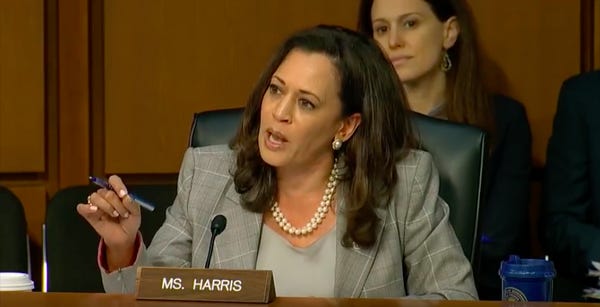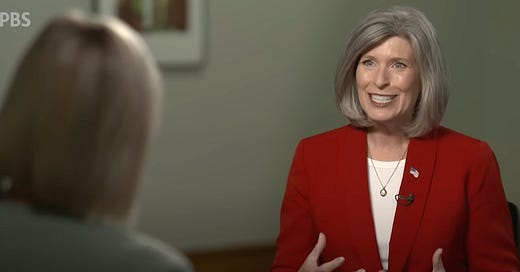
Kamala Harris Has Good Idea For Economy: Give Poor People Money To Buy Stuff.
Class War is good for you.
Kamala Harris is just one of several Democrats who'd like you to think about an alternative to the Republicans' Great Big Tax Cuts for Rich Fuckwads bill from last year. Instead of redistributing wealth to those who are already rich, how about we make a similar outlay in public spending, but give it to middle and working class people who would spend most of it on rent, groceries, a treat sometimes, and other basics, which would create demand for products and actually spread wealth through the economy? As we've already seen, Trump's tax cut for corporations and the already wealthy has mostly gone into stock buybacks, not to workers, so what about if we give millions of people the ability to buy groceries and furniture and school supplies, instead of helping out yacht brokers?
Does that sound like class war? Bet your sweet ass it does -- but it's really a counterattack after nearly 40 years of Reaganism.
The Atlantic's economics reporter Annie Lowrey has a nice overview of proposals by several prominent Democrats to use tax policy to address the wealth inequality that's been building ever since Republicans in the 1980s handed over the job of writing American financial policy to Wall Street lobbyists. Kamala Harris's proposal, the "LIFT the Middle Class Act," gets most of the attention, although the article also looks at competing plans that similarly seek to give a boost to people in the lower half of the economy. The LIFT plan would
provide monthly cash payments of up to $500 to lower-income families, on top of the tax credits and public benefits they already receive. " Last year, Congress gave a trillion dollars in tax breaks to corporations," Harris told me. "That money should have gone to American taxpayers who need it instead of handing it over to corporations and the top 1 percent."
Why would we want to do that, for heavens sake? For one thing, it would address income inequality, which isn't merely a result of rich people working harder but of rich people literally writing the rules to benefit themselves:
Families in the bottom 20 percent of the income distribution are earning just $133 more a month today than they were a decade ago. (For families in the top 5 percent, the figure is $7,548.)
The middle class is shrinking, the poverty rate has remained constant, and everything is more expensive, while real wages haven't gone up, even though economic growth has increased. And of course, it would be good politics, since the Trump tax cuts remain thuddingly unpopular, even compared to tax increases under Bill Clinton and George H.W. Bush. Yet another poll just this week finds that most Americans don't believe last year's tax cuts have substantially helped them. Because they haven't.
Harris's proposal would cost about as much as the Trump tax cut, but it would go to people who don't have any corporate stock prices to inflate, but who do have kids to send to school, cars to fix or replace, and medical bills to pay:
Harris is offering as much as $3,000 a year for a single person or $6,000 a year for a married couple, on top of existing tax and transfer programs, disbursed either as a lump-sum tax refund or as a monthly payment. Working families making less than $100,000 a year would qualify, including those making close to nothing. As many as 80 million Americans would benefit, Harris's office has estimated, with the Center on Budget and Policy Priorities calculating that the proposal would lift 9 million people out of poverty, including nearly 3 million kids.
Harris isn't the only Democrat with a neat plan to redistribute wealth BACK TO the people from whom it was transferred over the past 40 years. There's also Sen. Sherrod Brown and Rep. Ro Khanna, who want to double the amount of the Earned Income Tax Credit (EITC) and make about 20 million more Americans eligible to receive it. Yet another plan to modify the EITC, making it available to students and family caregivers, is being proposed by Rep. Bonnie Watson Coleman.
Such plans would definitely redistribute wealth more fairly. And lordy, the current tax system isn't a natural reflection of rich people's "hard work"; it's rigged to the advantage of the investor class. For households in which no one went to college, real income has increased only about 3 percent since 1979; college graduates have seen better increases, but the biggest expansion of wealth has been granted to the top one percent, who are the best at buying legislation.
And while your Ayn Rand-reading idiots would whine about the injustice of "handouts" to the undeserving, tax money going to the lower rungs of the income ladder would actually be good for everyone, smoothing out the "income volatility" faced by most low-wage families:
In a given year, roughly two-thirds of lower-income adults have one month where their monthly income falls to less than 25 percent of their average income. For two in five of those lower-income adults, that is true in six months of the year. "These families' incomes are bouncing around all the time, more than we ever imagined they were," said Elaine Maag of the Tax Policy Center. "It leaves people feeling very uncertain and vulnerable."
Taking that uncertainty away would lead to far more people becoming able to save, to deal with a sudden emergency, to not have to quit their jobs if a car needed repairs, because hey, suddenly a $500 repair wouldn't be as devastating. Greater financial stability would mean more consistent ability to buy stuff, less missed work, less turnover, more small savings, and how's this for beautiful: less money wasted on payday loans.
Even given the good economy, and even given the passage of the Dodd-Frank bill, strip-mall lenders and tax-preparation services continue to target the financially distressed, offering loans with annual interest rates higher than 300 percent and tax-refund advances that come with obscene fees. Twelve million Americans, whose average income is just $30,000 a year, spend $9 billion a year on loan fees. The average payday- loan borrower spends nearly half the year in debt, and pays more in interest than she borrows in the first place.
So yes, there's at least one industry with a lot of clout that would lobby against any such scheme.
To sell such proposals, Harris and Brown and Khanna and Coleman would do really well to take the advice of Yr Wonkette's favorite billionaire and class traitor, Nick Hanauer, who wrote the influential 2014 essay "The Pitchforks Are Coming ... For Us Plutocrats." Hanauer, a big supporter of Barack Obama's call to expand the economy "from the middle out," emphasizes the practical benefits of a healthy working and middle class, insisting that both supply-side and classical economics are hooey. Money in the hands of people who'll really use it to buy stuff is, he says, the key to prosperity, because if you're making and selling moderately priced stuff to millions of people, you're going to generate more wealth across the economy than concentrating the wealth in a few hands and in the financial sector. And if you're making that stuff in America, hey, look, JOBS!
Hanauer was among the first to call for a national minimum wage of $15 an hour, and was a central mover in passing Seattle's minimum wage. And while talking about social justice is swell, he emphasizes it's something the rich would benefit from, too:
"I think one of the reasons the fight for 15 has been successful is the pro-growth narrative we constructed," Hanauer said in an interview. "And I created that narrative. Up until that point, the arguments people made for raising the minimum wage were that we feel bad for poor people and we should give them a little bit more."
Sure, he's not big on humility. But he sure as hell seems to have a winning angle on how to make the good of all attractive even to rich fuckwads. Fixing income inequality isn't the moon program or the Manhattan Project, but it will need to be sold to people who've been propagandized to think the super-rich have the answers, so please give them more money. Nice to see a rich guy who sees he'll be a lot better off if a lot of other folks are a little better off.
[ Atlantic / Marketplace / Forbes / Politico / American Prospect ]
Many hands make light Wonkette. We're ad-free and supported ONLY by YOU. Pitch in?












I'm not that tired, but i read "wildlife" as "midwife" and had a 'wut?' moment.
We're a long way from perfect - we're currently dealing with a shitshow where the right-wing government is tearing itself apart trying to cater to its fringes. There is a by-election TODAY which is hopefully the beginning of the end. If nothing else, they HAVE to go to a general election next year and are likely to be wiped out. I can only hope.